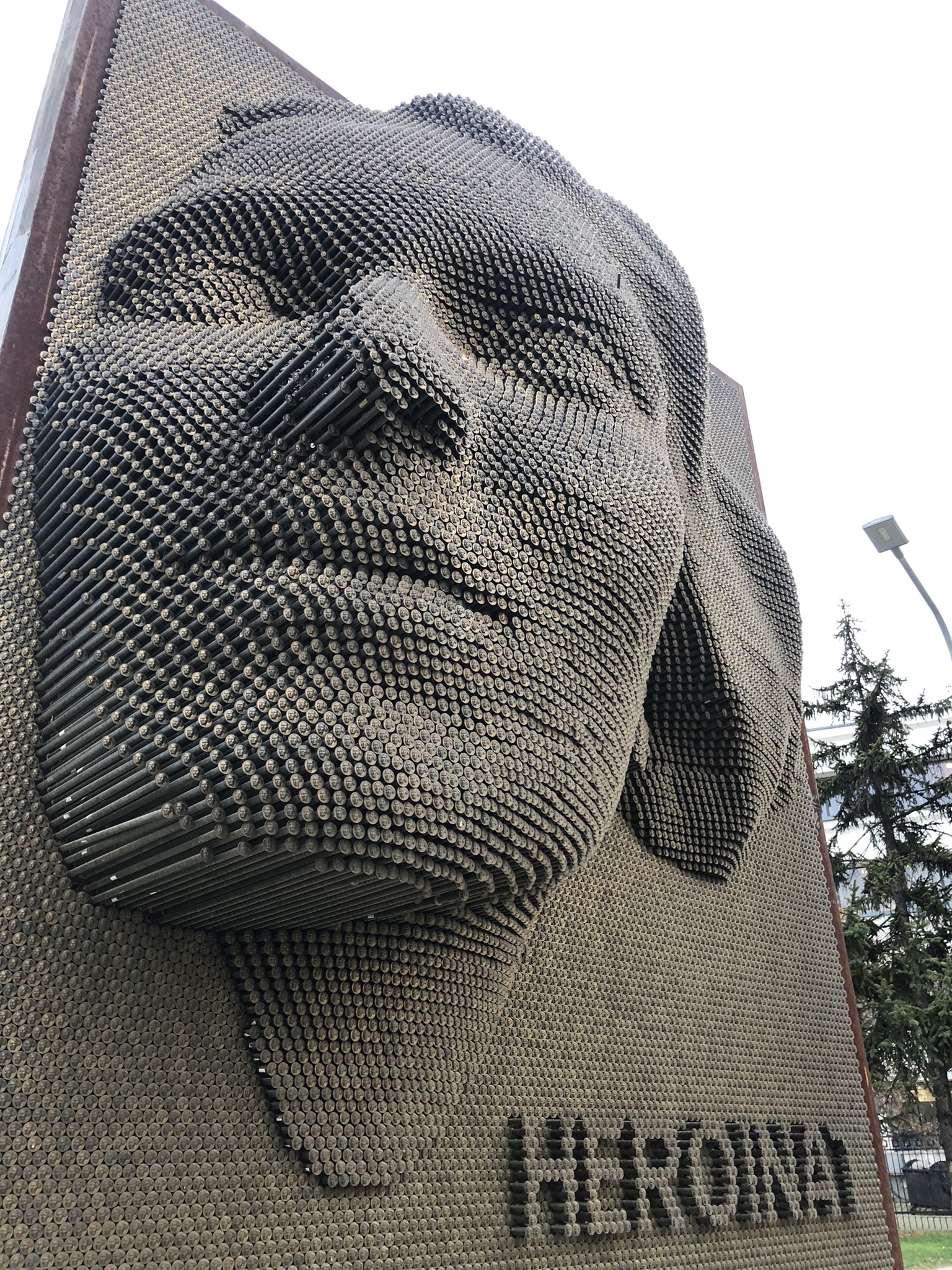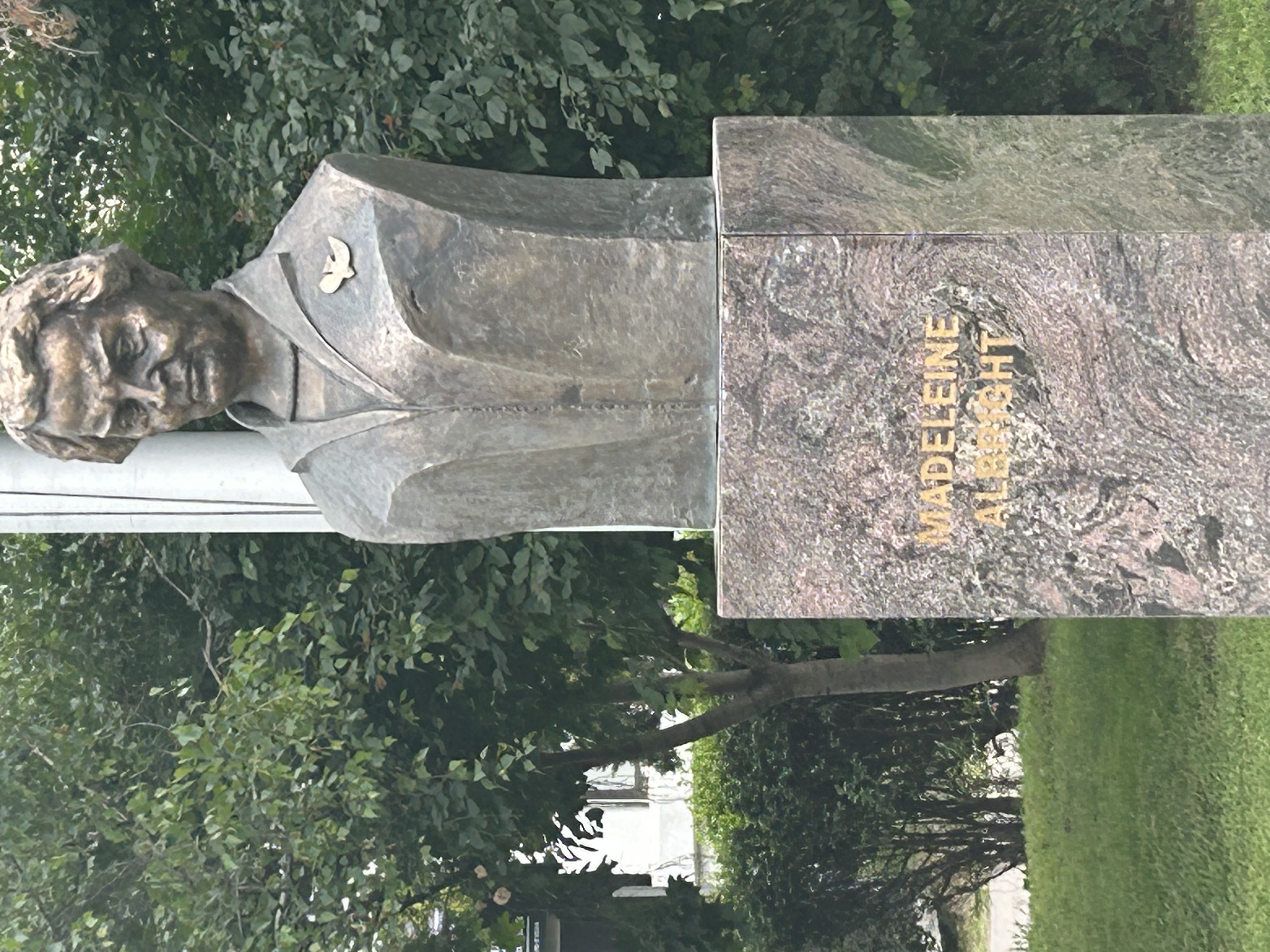Faleminderit ("Thank You")
I've settled into a daily routine for my workday now. Usually up by 6:00 a.m., I make my morning NesCafe, grab a chocolate croissant, and sit out on my balcony. The sun rises around 5:00 a.m. in the European summer and doesn't set until almost 8:30 p.m. It's also a good time to call my family back in California. I always wear something business casual and bring a blazer since I won't know if there's a training or conference I am attending until I get to work.
I walk down a few cobblestone back alleys until I hit the main street, Luan Haradinaj (named after a Kosovo Liberation Army hero, his brother was Prime Minister of Kosovo between 2004-2005). I walk past the Newborn monument and the Heroinat. The Heroinat is a memorial made of over 20,000 pins featuring the face of an Albanian woman. The composite portrait was made from the features of multiple women into one common image. Each pin represents an Albanian woman who subjected to sexual violence during the Kosovo War from 1998-1999. The pins are staggered in such a way that they create a 3D version of the same composite portrait.

Luan Haradinaj is filled with American symbols showcasing the relationship many in Kosovo feel is special between these two nations. Across the street from the Heroinat is a Route 66 restaurant, a mock 1950s diner. Continuing on, I walk past the Madeleine Albright square, featuring a bust and plaque of the United States' Secretary of State during the Kosovo War.

I stop by Mulliri, a popular Albanian chain coffee shop. While living in Rome, I tried to blend in with the locals by never having a takeaway coffee in my hand while walking down the street, a clear non-Italian activity. However, in Kosovo, there is a very tolerant "live your life" attitude so here I order a double cappuccino or, now that the weather is heating up, a freddo cappuccino. My 20-minute walk to work takes me past the police center, the major bus lines, some light traffic, and a variety of coffee shops.
Finally making it to the Academy, I'm always greeted by the security guard with a very warm miremenjes. There is always someone I know coming downstairs as I go up and everyone stops to ask how I'm doing and how I am finding Pristina. It's not just common courtesy here but the people in Pristina are genuinely warm and place a premium on hospitality. I spend the majority of my day on the top floor with my supervisor, the head of the legal research and publications department. We always spend our first fifteen minutes together going over our evenings/weekend, making more coffee, and having a snack (I've become addicted to the mini Jaffa cakes here). She then tells me if there are any trainings or conferences that have translators so I can attend or I work on my main project: a training manual for the legal research department.
Data Privacy and Access to Public Documents:
This week, however, I had the opportunity to travel slightly outside Pristina to attend a conference jointly held by the Academy of Justice, the Agency for Data Privacy, and EULEX (European Union Rule of Law Mission in Kosovo). The topic was data privacy and access to public documents and the audience was made of Kosovo judges and prosecutors from every province.
Data privacy concerns the private data of citizens who are involved in the court system in some fashion, whether that be as a suspect/defendant, a victim/plaintiff, or a witness. The court has an obligation to keep confidential data safe and secure. The lecturers presented information on how judges and prosecutors should approach the scope of warrants and how any information obtained from searches should be handled should a case not be brought for prosecution. One key point in Kosovo is that suspects whose data is interfered with through the course of an investigation (i.e. wiretapping) are to be notified after the investigation is completed that they were the target of such a search. They should also be notified that their data was deleted.
Other controversial topics discussed included the importance of consent in voluntary searches and whether consent can be given over the phone or if every voluntary search needs to be memorialized. The statute of limitations of crimes is important and any data collected for a crime that can no longer be prosecuted should be deleted from all systems.
On the other side of data privacy, there was a discussion on data incidents within the court system. Data incidents can include lost or stolen equipment, lost documents, hacking incidents, and the mishandling of case files. For example, if you are a prosecutor and are leaving for the weekend, how are you safeguarding your case files? If they are left on your desk and another prosecutor, who is not assigned to that case, can pick up your files, this is a data breach incident. In Kosovo, this needs to be reported immediately. Other examples given included losing an access keycard or finding one belonging to someone you know. In that case, you cannot simply return the keycard to the person but it must be reported and returned through proper channels so the timeframe of when the keycard was out of the original owner's possession can be investigated for unauthorized access. The training's purpose was to make it clear to those working with sensitive information in the court system that Kosovo citizens entrusted them with their private data. This trust needs to be maintained through a rigorous set of rules governing how data can be used, who can access it, confidentiality, and a respect for those who come to utilize their legal options.
One point I found particularly interesting was the issue of remote hearings. In the Kosovo Judicial Council's recommendations for trainings this year was on the new electronic case management system called e-Kosova. Judges and prosecutors are being trained on how to use it and how to conduct hearings and uploading court documents more efficiently. I had earlier discussions with Academy of Justice members on how remote hearings could help rural citizens access courts more effectively and speed up simpler cases. Before law school, I worked at a small family law firm and post-COVID we were still using remote hearings for almost all cases. It helped the attorneys immensely given they could attend multiple hearings in quick succession without running to various courthouses especially if the hearing was a quick five minute status update. However, remote hearings are conducted online. This creates a possibility of non-participants accessing closed hearings, not to mention an environment where any person could log in and attend an open court hearing. People may not show up to a courthouse on any given Tuesday morning if they are not participants but one could easily log in and listen to hearings of ordinary citizens in the sensitive arena that is family law. There are pros and cons to every new piece of technology introduced into the legal system and these trainings are vital to helping judges and prosecutors understand the safeguards necessary to protect the privacy of citizens.
Finally, a last point on data privacy is an interesting one for those in the United States- the right to be forgotten. The European Court of Human Rights and some European countries, like Germany, are discussing whether a person has a right to scrub the internet of any of their data. If we, as human beings, have a right not to be "searchable". The United States places an emphasis on the freedom of expression, where journalists and citizens can write whatever they please short of defamation or national security concerns and therefore has not established a right to erasure. In an age where one's new employer, landlord, or stalker can Google one's name and discover gigabytes of data, what rights do we have to keep our lives private?
If you're interested in further reading on the topic, I recommend starting with the European General Data Protection Regulation and the European Court of Human Rights case from 2014, Google Spain v. Agencia Espanola de Proteccion de Datos. In 2023, California passed the California Delete Act which may give Californians some ability to request their data be deleted by "third-party brokers" through the California Privacy Protection Agency, however, there are many exceptions including public records and the effects will not be seen until the CPPA establishes a mechanism for deletion requests, which it has until January 2026 to do so.
The second part of the conference was the topic of the citizens' right to access to public documents. The Council of Europe, which Kosovo is not a member but it frequently incorporates CoE materials into Kosovar Constitution and laws, considers this access to be a fundamental prerequisite to freedom of expression. Not only do courts need to make public interest documents available but they must be accessible in a reasonable way and public authorities should be publishing basic information proactively. Refusals must be justified. Materials should be published in the languages of the communities interested, including minority ones, and there should be some mechanism of keeping the public informed on what types of information is available, how to access the information, and how to request items not available online. The European Union Agency for Fundamental Rights keeps a database on the case law and subsequent international law declarations revising this right.
In Kosovo, this right is enshrined in Article 41 of the Constitution and Public Law no. 03/L-215.